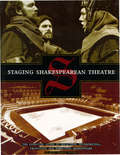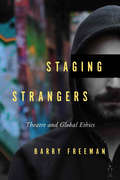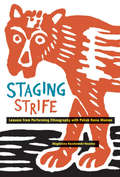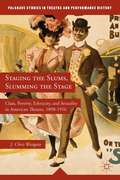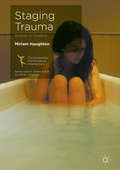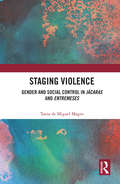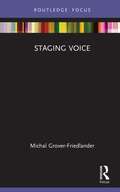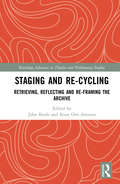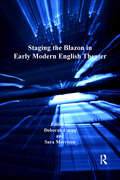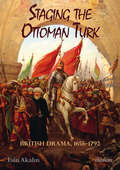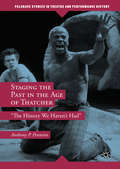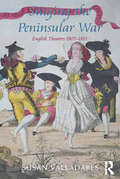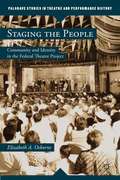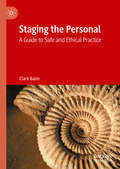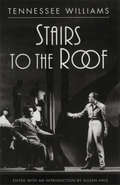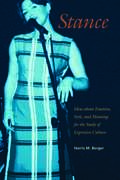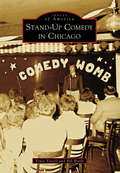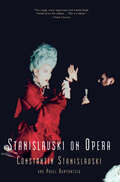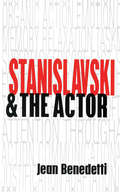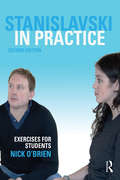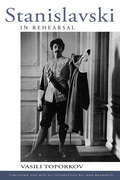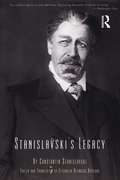- Table View
- List View
Staging Shakespearean Theatre: The Essential Guide to Selecting, Interpreting, Producing and Directing Shakespe are
by Elaine NovakFrom auditions and rehearsals to publicity, this guide leads even inexperienced directors, producers, choreographers and actors through the complicated and sometimes fearsome task of staking Shakespeare. Comprehensive information is presented in a browsable format including historical background of the Elizabeth period, descriptions of major plays, a glossary of terms, suggestions for modern interpretations, step-by-step instruction for choreographing fight scenes, and a full treatment of Romeo & Juliet
Staging Strangers: Theatre and Global Ethics
by Barry FreemanTwenty-first-century media and political discourse sometimes makes "strangers" - refugees, immigrants, minorities - the scapegoats for social and economic disorder. In this heated climate, theatre has the potential to promote greater compassion and empathy for outsiders. A study of cultural difference in contemporary Canadian theatre, Staging Strangers considers how theatre facilitates an understanding of distant places and issues. Theatre in Canada, and especially in Toronto, has long been a place for communities to celebrate their traditions, but it is now emerging as a forum for staging stories that stretch beyond the local and the national. Combining archival research and performance analysis, Barry Freeman analyzes the possibilities and hazards of representing strangers, and the many ways the stranger on stage may be fetishized or domesticated, marked for assimilation, or turned into an object of fear. A fresh look at ways to cultivate ethical responsibility for global issues, Staging Strangers imagines a role for theatre in creating a more tolerant, caring, and cooperative world.
Staging Strangers: Theatre and Global Ethics
by Barry FreemanTwenty-first-century media and political discourse sometimes makes "strangers" - refugees, immigrants, minorities - the scapegoats for social and economic disorder. In this heated climate, theatre has the potential to promote greater compassion and empathy for outsiders. A study of cultural difference in contemporary Canadian theatre, Staging Strangers considers how theatre facilitates an understanding of distant places and issues. Theatre in Canada, and especially in Toronto, has long been a place for communities to celebrate their traditions, but it is now emerging as a forum for staging stories that stretch beyond the local and the national. Combining archival research and performance analysis, Barry Freeman analyzes the possibilities and hazards of representing strangers, and the many ways the stranger on stage may be fetishized or domesticated, marked for assimilation, or turned into an object of fear. A fresh look at ways to cultivate ethical responsibility for global issues, Staging Strangers imagines a role for theatre in creating a more tolerant, caring, and cooperative world.
Staging Strife
by Magdalena Kazubowski-HoustonConcerned with traditional power imbalances between researchers and participants, contemporary social science has begun using collaborative research as an empowering methodology that involves participants in key decisions. Collaborative research is a potentially revolutionary method for studying people and their cultures, but does it work in practice? Staging Strife looks at the limits of this methodology by examining a politically charged theatre performance undertaken with a group of Roma women in Poland. Magdalena Kazubowski-Houston describes a production she co-wrote and co-directed using collaborative methods. She had hoped this would result in more equitable research and raise community awareness about the violence and racism Roma women face. Instead, she found herself embroiled in ethically questionable power games in order to salvage the production. Staging Strife is the result of a painful re-examination of the experience, her motives as a researcher, and a long-overdue critique of collaborative research. Disarmingly honest, this exploration of innovative theatre techniques and social science methodologies will lead anthropologists to rethink the ways in which they work.
Staging Strife: Lessons from Performing Ethnography with Polish Roma Women (ISSN)
by Magdalena Kazubowski-HoustonConcerned with traditional power imbalances between researchers and participants, contemporary social science has begun using collaborative research as an empowering methodology that involves participants in key decisions. Collaborative research is a potentially revolutionary method for studying people and their cultures, but does it work in practice? Staging Strife looks at the limits of this methodology by examining a politically charged theatre performance undertaken with a group of Roma women in Poland.
Staging The Slums, Slumming The Stage
by J. Chris WestgateDrawing on traditional archival research, reception theory, cultural histories of slumming, and recent work in critical theory on literary representations of poverty, Westgate argues that the productions of slum plays served as enactments of the emergent definitions of the slum and the corresponding ethical obligations involved therein.
Staging Trauma: Bodies In Shadow (Contemporary Performance Interactions )
by Miriam HaughtonThis book investigates contemporary British and Irish performances that stage traumatic narratives, histories, acts and encounters. It includes a range of case studies that consider the performative, cultural and political contexts for the staging and reception of sexual violence, terminal illness, environmental damage, institutionalisation and asylum. In particular, it focuses on 'bodies in shadow' in twenty-first century performance: those who are largely written out of or marginalised in dominant twentieth-century patriarchal canons of theatre and history. This volume speaks to students, scholars and artists working within contemporary theatre and performance, Irish and British studies, memory and trauma studies, feminisms, performance studies, affect and reception studies, as well as the medical humanities.
Staging Violence: Gender and Social Control in Jácaras and Entremeses
by Tania de Miguel MagroStaging Violence explores gender violence in Spanish early modern short theater. This book deals with domestic violence against women, extortion of prostitutes, and violence against men who display non-conventional forms of masculinity. The author argues that many "jácaras" and "entremeses" stage subversive discourses that repudiate or complicate official narratives of gender and the use of violence as a tool for achieving gender compliance. Short comic pieces are read against comedias. Each section of the book is expertly contextualized through an overview of the legal and moral contexts and the analysis of a variety of primary sources (law codes, manuals of conduct, church rulings, transcripts of civil and religious trials, and medical manuals) as well as statistical information. Staging Violence invites the reader to consider the transgressive potential of performance. As the first monograph entirely dedicated to the study of gender in this genre, this book is a vital resource for students and scholars interested in gender studies and theatre.
Staging Voice (Routledge Voice Studies)
by Michal Grover-FriedlanderStaging Voice is a unique approach to the aesthetics of voice and its staging in performance. This study reflects on what it would mean to take opera’s decisive attribute—voice—as the foundation of its staged performance. The book thinks of staging through the medium of voice. It is a nuances exploration, which brings together scholarly and directorial interpretations, and engages in detail with less frequently performed works of major and influential 20th-century artists—Erik Satie, Bertolt Brecht and Kurt Weill—as well as exposes readers to an innovative experimental work of Evelyn Ficarra and Valerie Whittington. The study is intertwined throughout with the author’s staging of the works accessible online. This book will be of great interest to students and scholars in voice studies, opera, music theatre, musicology, directing, performance studies, practice-based research, theatre, visual art, stage design, and cultural studies.
Staging and Performing Translation
by Roger Baines Cristina Marinetti Manuela PerteghellaStaging and Performing Translation: Text and Theatre Practice explores the territory between translation theory and practice in contemporary theatre. Featuring contributions by academics from theatre and translation studies, as well as translators, directors, actors, dramaturges and literary managers, and an interview with playwright-translator-adapter Christopher Hampton, this collection attempts to delineate a new space for the discussion of translation in the theatre that is international, critical and scholarly while rooted in experience and understanding of theatre practice. The volume will be of interest to academics, lecturers and postgraduate students working and researching in the fields of translation studies, performance studies, and drama and theatre studies. The book offers innovative approaches to both the translation of play-texts and research methodologies, providing a useful pedagogical tool for the development of theatre translation modules or courses. The practical nature of the contributions will also be of interest to actor-training institutions as well as theatre practitioners and cultural promoters.
Staging and Re-cycling: Retrieving, Reflecting and Re-framing the Archive (Routledge Advances in Theatre & Performance Studies)
by John KeefeIn Staging and Re- cycling , John Keefe and Knut Ove Arntzen re-visit and reappraise a selection of their work to explore how the retrieval, re-approaching and re-framing of material can offer pathways for new work and new thinking. The book includes a collection of reprinted and first-published (although previously presented) textual material interspersed with editorial material – reflective essays from John and Knut on these pieces from the archives and original essays from invited scholars that explore the theme of repetition and re-cycling. The project has a number of aims: to suggest how the status of ‘new’ with regard to academic and staged dramaturgical materials may be reframed; to re-examine these through certain lenses and concepts (re-cycling; re-working; the spectator; landscape, post- and other dramaturgies); to explore the possibilities of critique offered by particular modes of juxtaposition, dialogue and dialectic; to offer further provocations to received ideas; and to retrieve and re-approach material, once published or presented, that becomes ‘lost’ in archives or on library shelves. As shown here, the role of the hyphen acts as an indicator to the status of ‘re-’ in relation to the ‘new’. Written for scholars and academics, researchers, undergraduate and postgraduate students, and practitioners working in all forms for theatre and performance, Staging and Re-cycling suggests a new form of dialogue between work, authors and readers, and draws out threads that extend back into the past and potentially forward into the future.
Staging the Blazon in Early Modern English Theater (Studies In Performance And Early Modern Drama)
by Sara Morrison Deborah UmanOffering the first sustained and comprehensive scholarly consideration of the dramatic potential of the blazon, this volume complicates what has become a standard reading of the Petrarchan convention of dismembering the beloved through poetic description. At the same time, it contributes to a growing understanding of the relationship between the material conditions of theater and interpretations of plays by Shakespeare and his contemporaries. The chapters in this collection are organized into five thematic parts emphasizing the conventions of theater that compel us to consider bodies as both literally present and figuratively represented through languge. The first part addresses the dramatic blazon as used within the conventions of courtly love. Examining the classical roots of the Petrarchan blazon, the next part explores the violent eroticism of a poetic technique rooted in Ovidian notions of metamorphosis. With similar attention paid to brutality, the third part analyzes the representation of blazonic dismemberment on stage and screen. Figurative battles become real in the fourth part, which addresses the frequent blazons surfacing in historical and political plays. The final part moves to the role of audience, analyzing the role of the observer in containing the identity of the blazoned woman as well as her attempts to resist becoming an objectified spectacle.
Staging the Ottoman Turk: British Drama, 1656–1792
by Esin AkalınIn the wake of the fear that gripped Europe after the fall of Constantinople in 1453, English dramatists, like their continental counterparts, began representing the Ottoman Turks in plays inspired by historical events. The Ottoman milieu as a dramatic setting provided English audiences with a common experience of fascination and fear of the Other. The stereotyping of the Turks in these plays—revolving around complex themes such as tyranny, captivity, war, and conquests—arose from their perception of Islam. The Ottomans' failure in the second siege of Vienna in 1683 led to the reversal of trends in the representation of the Turks on stage. As the ascending strength of a web of European alliances began to check Ottoman expansion, what then began to dazzle the aesthetic imagination of eighteenth century England was the sultan's seraglio with images of extravaganza and decadence. In this book, Esin Akalin draws upon a selective range of seventeenth and eighteenth century plays to reach an understanding, both from a non-European perspective and Western standpoint, how one culture represents the other through discourse, historiography, and drama. The book explores a cluster of issues revolving around identity and difference in terms of history, ideology, and the politics of representation. In contextualizing political, cultural, and intellectual roots in the ideology of representing the Ottoman/Muslim as the West's Other, the author tackles with the questions of how history serves literature and to what extent literature creates history.
Staging the Past in the Age of Thatcher: The History We Haven't Had (Palgrave Studies In Theatre And Performance History Ser.)
by Anthony P. PenninoThis book investigates how the British theatrical community offered an alternative and oppositional historical narrative to the heritage culture promulgated by the Thatcher and Major Governments in the 1980s and early 1990s. It details the challenges the theatre faced, especially reductions in government funding, and examines seminal playwrights of the period – including but not limited to Caryl Churchill, Howard Brenton, Sarah Daniels, David Edgar, and Brian Friel – who dramatized a more inclusive vision of history that gave voice to traditionally marginalized communities. It employs James Baldwin’s concept of witnessing as the means by which history could be deployed to articulate an alternative and emergent political narrative: “the history we haven’t had”. This book will appeal to students and scholars of theatre and cultural studies as well as theatre practitioners and enthusiasts.
Staging the Peninsular War: English Theatres 1807-1815
by Susan ValladaresFrom Napoleon's invasion of Portugal in 1807 to his final defeat at Waterloo, the English theatres played a crucial role in the mediation of the Peninsular campaign. In the first in-depth study of English theatre during the Peninsular War, Susan Valladares contextualizes the theatrical treatment of the war within the larger political and ideological axes of Romantic performance. Exploring the role of spectacle in the mediation of war and the links between theatrical productions and print culture, she argues that the popularity of theatre-going and the improvisation and topicality unique to dramatic performance make the theatre an ideal lens for studying the construction of the Peninsular War in the public domain. Without simplifying the complex issues involved in the study of citizenship, communal identities, and ideological investments, Valladares recovers a wartime theatre that helped celebrate military engagements, reform political sympathies, and register the public’s complex relationship with Britain’s military campaign in the Iberian Peninsula. From its nuanced reading of Richard Brinsley Sheridan's Pizarro (1799), to its accounts of wartime productions of Shakespeare, description of performances at the minor theatres, and detailed case study of dramatic culture in Bristol, Valladares’s book reveals how theatrical entertainments reflected and helped shape public feeling on the Peninsular campaign.
Staging the People
by Elizabeth A. OsborneThe Federal Theatre Project stands alone as the only national theatre in the history of the United States. This study re-imagines this vital moment in American history, considering the Federal Theatre Project on its own terms - as a "federation of theatres" designed to stimulate new audiences and create locally-relevant theatre during the turbulent 1930s. It integrates a wealth of previously undiscovered archival materials with cultural history, delving into regional activities in Chicago, Boston, Portland, Atlanta, and Birmingham, as well as tours of refugee camps and Civilian Conservation Corps Divisions. For a brief, exhilarating moment, the Federal Theatre Project created a democratic theatre that staged the American people.
Staging the Personal: A Guide to Safe and Ethical Practice
by Clark BaimThis book examines the history, ethics, and intentions of staging personal stories and offers theatre makers detailed guidance and a practical model to support safe, ethical practice. Contemporary theatre has crossed boldly into therapeutic terrain and is now the site of radical self-exposure. Performances that would once have seemed shockingly personal and exposing have become commonplace, as people reveal their personal stories to audiences with ever-increasing candor. This has prompted the need for a robust and pragmatic framework for safe, ethical practice in mainstream and applied theatre. In order to promote a wider range of ethical risk-taking where practitioners negotiate blurred boundaries in safe and artistically creative ways, this book draws on relevant theory and practice from theatre and performance studies, psychodrama and attachment narrative therapy and provides detailed guidance supporting best practice in the theatre of personal stories. The guidance is structured within a four-part framework focused on history, ethics, praxis, and intentions. This includes a newly developed model for safe practice, called the Drama Spiral.The book is for theatre makers in mainstream and applied theatre, educators, students, researchers, drama therapists, psychodramatists, autobiographical performers, and the people who support them.
Stairs to the Roof
by Tennessee Williams Allean HaleA play produced only twice in the 1940s and now published for the first time reveals that Tennessee Williams anticipated the themes of Star Trek by decades. Sixty years ago a young Tennessee Williams wrote a play looking toward the year 2001. Stairs to the Roof is a rare and different Williams' work: a love story, a comedy, an experiment in meta-theater, with a touch of early science fiction. Tennessee Williams called Stairs to the Roof "a prayer for the wild of heart who are kept in cages" and dedicated it to "all the little wage earners of the world." It reflects the would-be poet's "season in hell" during the Depression when he had to quit college to type orders eight hours a day at the International Shoe Factory in St. Louis. Stairs is Williams' revenge, expressed through his alter ego, Benjamin Murphy, the clerk who stages a one-man rebellion against the clock, the monotony of his eight-to-five job, and all the dehumanizing forces of an increasingly mechanized and commercial society. Ben's swift-moving series of fantastic adventures culminate in an escape from the ordinary that is an endorsement of the American dream. In 1941 with the world at war and civilization in danger of collapse, Williams dared to imagine a utopian future as Ben leads us up his stairs towards the Millennium. Stairs to the Roof was produced only twice, once at the Playbox in Pasadena, California, in 1945, and subsequently at the Pasadena Playhouse in 1947. Now, in an edition meticulously prepared by noted Williams scholar Allean Hale, Williams fans can share this play of youthful optimism.
Stance: Ideas about Emotion, Style, and Meaning for the Study of Expressive Culture (Music Culture)
by Harris M. BergerWhy does music move us? How do the immediate situation and larger social contexts influence the meanings that people find in stories, rituals, or films? How do people engage with the images and sounds of a performance to make them come alive in sensuous, lived experience? Exploring these questions, Stance presents a major new theory of emotion, style, and meaning for the study of expressive culture. In clear language, the book reveals dimensions of lived experience that everyone is aware of but that scholars rarely account for.Though music is at the heart of the book, its arguments are illustrated with a wide range of clear examples--from the heavy metal concert to the recital hall, from festivals to dance, stand-up comedy, the movies, and beyond. Helping ethnographers get closer to the experiences of the people with whom they work, this book will be of immediate interest to anyone in ethnomusicology, folklore, popular music studies, anthropology, or performance studies.
Stand-Up Comedy in Chicago
by Vince Vieceli Bill BradyTen years after Chicago saw its first full-time comedy club open, the landscape was decidedly different. "Stand-up comedy has exploded in the last couple of years," a club owner told the Chicago Tribune in 1985, "that's the only way to describe it: exploded." It was truly a comedy boom, with as many as 16 clubs operating at once, and it lasted nearly a decade before fading, taking with it some of Chicago's oldest comedy stages, including the Comedy Cottage, Comedy Womb, and Who's on First. Still, stalwarts like Barrel of Laughs (south) and Zanies (north) persevered. That part of the story is known; overlooked is the fact there was a comedy boom, period. To hear the story, it is as if stand-up comedy innately morphed from a dated nightclub scene to what one Chicago Sun-Times writer called "Chicago's atomic comedy blast."
Stanislavski On Opera
by Constantin Stanislavski Pavel RumyantsevBest known for his fundamental work on acting, Stanislavski was deeply drawn to the challenges of opera. His brilliant chapters here on Russian classics--Boris Gudonov and The Queen of Spades among them--as well as La Boheme will amaze and delight lovers of opera. Also includes 12 musical examples.
Stanislavski and the Actor: The Method of Physical Action (Performance Bks.)
by Jean BenedettiFirst published in 1999. Routledge is an imprint of Taylor & Francis, an informa company.
Stanislavski in Practice: Exercises for Students
by Nick O'BrienStanislavski in Practice is an unparalleled step-by-step guide to Stanislavski’s system. Author Nick O’Brien makes this cornerstone of acting accessible to teachers and students alike through the use of practical exercises that allow students to develop their skills. This second edition offers more exercises for the actor, and also new sections on directing and devising productions. Each element of the system is covered practically through studio exercises and jargon-free discussion. Exercises are designed to support syllabi from Edexcel, Eduqas, OCR and AQA to the practice-based requirements of BTEC and IB Theatre. This is the perfect exercise book for students and a lesson planner for teachers at post-16 and first year undergraduate level. New to this edition: Thoroughly reorganized sections, including 'Work on the Actor', 'Work on a Role' and 'Developing your Practice'; A new chapter on using Stanislavski when devising with a series of exercises that will allow students to structure and create characters within the devising process; A new chapter, Directing Exercise Programme, which will be a series of exercises that allows the student to develop their skills as a director; New glossary with US and UK terms; New exercises developed since the publication of the first edition; A new chapter going beyond Stanislavski, exploring exercises from Michael Chekhov, Maria Knebel and Katie Mitchell.
Stanislavski in Rehearsal
by Vasily Osipovich ToporkovVasili Toporkov was one of the rare outsiders ever to be invited to join the Moscow Art Theatre. Although already an experienced and accomplished artist, he was forced to retrain as an actor under Stanislavski's rigorous guidance. This is Toporkov's account of this learning process, offering an insight into Stanislavski's legendary "system" and his method of rehearsal that became known as the method of physical action. Spanning ten years - from 1928 to 1938 - Toporkov charts the last crucial years of Stanislavski's work as a director. Toporkov reveals Stanislavski as a multi-faceted personality - funny, furious, kind, ruthless, encouraging, exacting - waging war against clichés and quick answers, inspiring his actors and driving to despair in his pursuit of artistic perfection. Jean Benedetti's new translation of Toporkov's invaluable record restores to us the vitality and insight of Stanislavski's mature thoughts on acting.
Stanislavski's Legacy: A Collection Of Comments On A Variety Of Aspects Of An Actor's Art And Life
by Constantin StanislavskiFirst Published in 1987. Routledge is an imprint of Taylor & Francis, an informa company.
